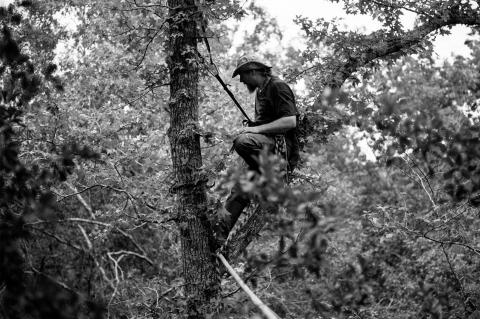SXSW Review: Above All Else

East Texas isn't exactly a hotbed of political activism -- at least not the kind of activism that makes the world a better place.
The heavily wooded, mostly rural region of Texas is one of the reddest parts of a mostly red state, a place firmly rooted in Southern cultural tradition, deeply conservative religious fervor, economic libertarianism and anachronistic good ol' boy politics. It's the last place you'd expect a bunch of hippies to pick a fight with a giant corporation.
But a bunch of hippies did. Their battle is the subject of Above All Else, filmmaker John Fiege's engaging and enraging documentary about a group of activists and landowners determined to stop construction of the reviled Keystone XL oil pipeline on their land.
The pipeline is slated to carry tar sands oil -- a particularly dirty, viscous, gritty kind of petroleum -- from Alberta, Canada to refineries on the Texas Gulf Coast. Pipeline proponents claim it will increase North American energy independence and create jobs; opponents claim it's potentially dangerous and will kill more jobs than it creates. They also oppose the continued burning of fossil fuels, which exacerbates global warming.
The two sides have been at war since the pipeline's inception, even on unlikely battlegrounds such as the piney woods of East Texas. Above All Else captures one battle among many, a nasty confrontation in which East Texas landowners and activists go to extreme lengths to block the pipeline's progress.
There are many players in Above All Else, but the film's focus is on David Daniel, a former stuntman and high-wire performer who retired after too many close calls. He and his wife bought a woodsy parcel of rural land in East Texas and looked forward to a quiet life among nature, only to find that pipeline builder TransCanada planned to bisect their property with the Keystone XL, clearing a 100 ft. wide right-of-way in the process.
As the film opens, Daniel puts up an amazing fight. He opens his land to Tar Sands Blockade, an group of tree-sitting activists who build crude (but surprisingly sturdy and livable) tree houses atop trees in the pipeline's path. Above All Else's most amazing footage is shot from the treetops, as the activists construct their makeshift homes and patiently wait for TransCanada to arrive with its massive -- and rather terrifying -- deforestation equipment.
Daniel encourages his fellow landowners to join the battle; several do, although in less dramatic ways. The most striking aspect of Above All Else is that the pipeline opponents are hardly a bunch of dirty commie hippies. Okay -- some are exactly the kind of people Rick Perry would tell to get a haircut and a job, if not shoot them on sight. But most don't fit the activist stereotype at all; they're mainstream small-town folk (some are gentle, sweet-looking grandmothers) who are hardly tree huggers. Their main beef with the pipeline is that it will cross their land whether they want it to or not (thanks, eminent domain!), and they'll be damned if a corporation -- a foreign corporation from socialist Canada, no less -- will tell them what to do with their own property.
On the surface, the Keystone XL battle is a classic us vs. them, good vs. evil story. But the point of Above All Else isn't just that powerful corporations will stop at nothing to get their way, despite massive protests from coalitions of rather strange bedfellows. (Most liberals and a lot of conservatives hate the Keystone XL, if for very different reasons.) The movie digs deeper, showing us that the game is more complex than simply fighting for or against something. Everyone's under pressure, from an activist dealing with a stressed out, neglected spouse to a pipeline surveyor who just wants to keep his job.
While it has a sense of fair play, Above All Else is an unapologetic anti-pipeline polemic. This isn't a problem for a documentary, as long as it doesn't try to hide its purpose and makes its arguments truthfully. As far as I can tell (based on following the issue for years), Above All Else does.
Politics aside, Above All Else's cinematic qualities are fine, if not remarkable. It looks and feels like so many other documentaries of its genre, a mishmash of professional cinematography and grainy shaky-cam footage, carefully staged interviews and shot-on-the-fly scenes of dramatic confrontations. (In the post-screening Q&A, editor Leah Marino said she stitched together footage in more than two dozen formats. Someone owes her a few beers.) The story arc is captivating and often poignant, an intimate look at the players rather than a dry overview of the issue.
Like any well-crafted documentary, Above All Else isn't really about a pipeline -- it's about people. And like any effective polemic, it inspires hope that someday, the people will stop the pipeline.
Austin/Texas connections: Shot in East Texas, Above All Else received an Austin Film Society Grant in 2013. John Fiege lives in Austin and earned an MFA in film production at the University of Texas at Austin, where he also was a lecturer. Leah Marino lives in Austin. (She also was cinematographer on another SXSW selection, No No: A Dockumentary.) Producer Christopher Lucas earned a doctorate in media studies from The University of Texas at Austin, and taught film and new media at Trinity University in San Antonio.
Above All Else screens again at SXSW on Saturday, March 15 at 2 pm at the Topfer Theatre at ZACH.


Great review Don.
Great review Don.